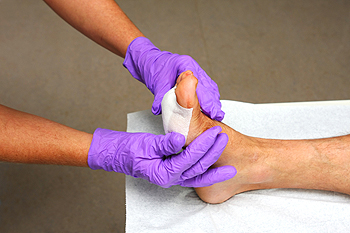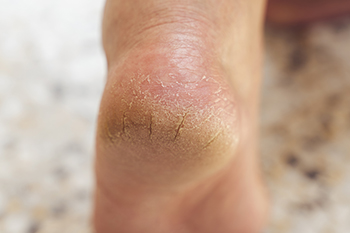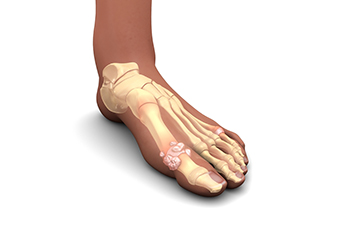Items filtered by date: August 2024
Foot Wounds Among the Elderly

Foot wound care is essential for everyone, but it is particularly important for the elderly, who are at a higher risk due to drier skin and a greater likelihood of dehydration. Regularly checking feet for any cuts, blisters, or signs of infection is important. Applying moisturizer helps keep the skin supple, reducing the risk of skin tears, a common issue in this age group. Pressure ulcers and diabetic wounds also require close attention, as these can easily become serious if left untreated. Staying hydrated is important for overall skin health, so encourage regular water intake. If a wound shows signs of infection, such as redness, warmth, swelling, or pus, it is vital to consult a podiatrist promptly to prevent complications. Early intervention and proper care can make all the difference in maintaining foot health. If you are elderly or are taking care of a senior, it is suggested that you consult a podiatrist if any foot wounds need special care.
Wound care is an important part in dealing with diabetes. If you have diabetes and a foot wound or would like more information about wound care for diabetics, consult with one of our podiatrists from Houston Foot and Ankle Care. Our doctors will assess your condition and provide you with quality foot and ankle treatment.
What Is Wound Care?
Wound care is the practice of taking proper care of a wound. This can range from the smallest to the largest of wounds. While everyone can benefit from proper wound care, it is much more important for diabetics. Diabetics often suffer from poor blood circulation which causes wounds to heal much slower than they would in a non-diabetic.
What Is the Importance of Wound Care?
While it may not seem apparent with small ulcers on the foot, for diabetics, any size ulcer can become infected. Diabetics often also suffer from neuropathy, or nerve loss. This means they might not even feel when they have an ulcer on their foot. If the wound becomes severely infected, amputation may be necessary. Therefore, it is of the upmost importance to properly care for any and all foot wounds.
How to Care for Wounds
The best way to care for foot wounds is to prevent them. For diabetics, this means daily inspections of the feet for any signs of abnormalities or ulcers. It is also recommended to see a podiatrist several times a year for a foot inspection. If you do have an ulcer, run the wound under water to clear dirt from the wound; then apply antibiotic ointment to the wound and cover with a bandage. Bandages should be changed daily and keeping pressure off the wound is smart. It is advised to see a podiatrist, who can keep an eye on it.
If you have any questions, please feel free to contact our offices located in Inner Loop, Southwest, Greater Heights, and Pearland, TX . We offer the newest diagnostic and treatment technologies for all your foot care needs.
Heel Pain Can Be Treated!
Causes and Symptoms of Cracked Heels

Cracked heels, also known as heel fissures, occur when the skin on the heels becomes dry and thickened, leading to painful cracks, termed fissures. This condition often results from excessive pressure, poor foot hygiene, or prolonged exposure to dry environments. Common causes include wearing open-backed shoes, standing for long periods of time, and having underlying conditions like diabetes or eczema. Risk factors include obesity, lack of moisture, and certain medical conditions that affect skin health. Symptoms of cracked heels often include rough, thickened skin on the heels, visible cracks, and discomfort or pain, particularly while walking. Painful cracked heels can interfere with completing daily activities. If you have developed this condition, it is strongly suggested that you visit a podiatrist who can offer treatment, which may include prescribed medication.
Cracked heels are unsightly and can cause further damage to your shoes and feet. If you have any concerns, contact one of our podiatrists from Houston Foot and Ankle Care. Our doctors can provide the care you need to keep you pain-free and on your feet.
Cracked Heels
Cracked heels appear unappealing and can make it harder for you walk around in sandals. Aside from looking unpleasant, cracked heels can also tear stockings, socks, and wear out your shoes. There are several methods to help restore a cracked heel and prevent further damage.
How Do You Get Them?
Dry skin is the number one culprit in creating cracked heels. Many athletes, walkers, joggers, and even swimmers suffer from cracked heels. Age and skin oil production play a role to getting cracked heels as well.
Promote Healing
Over the counter medicines can help, especially for those that need instant relief or who suffer from chronic dry feet.
Wear Socks – Wearing socks with medicated creams helps lock in moisture.
Moisturizers – Applying both day and night will help alleviate dryness which causes cracking.
Pumice Stones – These exfoliate and remove dead skin, which allows for smoother moisturizer application and better absorption into the skin.
Change in Diet
Eating healthy with a well-balanced diet will give the skin a fresh and radiant look. Your body responds to the kinds of food you ingest. Omega-3 fatty acids and zinc supplements can also revitalize skin tissue.
Most importantly, seek professional help if unsure how to proceed in treating cracked heels. A podiatrist will help you with any questions or information needed.
If you have any questions, please feel free to contact our offices located in Inner Loop, Southwest, Greater Heights, and Pearland, TX . We offer the newest diagnostic and treatment technologies for all your foot care needs.
Facts About Managing Gout

Managing gout attacks involves a combination of lifestyle changes and medical treatments to reduce uric acid levels and prevent flare-ups. Gout, once known as a disease of kings due to its association with rich foods and alcohol, is now widespread, affecting over eight million US adults. The rise in cases is also linked to obesity and high blood pressure. Gout is caused by uric acid crystals in the joints, leading to intense pain, redness and swelling, commonly in the big toe. Prevention strategies include losing weight, avoiding alcohol and high-purine foods like red meat and seafood, and incorporating low-fat dairy into your diet. Medications to lower uric acid levels are often necessary and regular use of them can significantly reduce the frequency and severity of gout attacks. These measures can improve the quality of life and prevent long-term joint damage. If you have symptoms of gout, it is suggested that you schedule an appointment with a podiatrist for help in managing it effectively.
Gout is a painful condition that can be treated. If you are seeking treatment, contact one of our podiatrists from Houston Foot and Ankle Care. Our doctors will treat your foot and ankle needs.
What Is Gout?
Gout is a form of arthritis that is characterized by sudden, severe attacks of pain, redness, and tenderness in the joints. The condition usually affects the joint at the base of the big toe. A gout attack can occur at any random time, such as the middle of the night while you are asleep.
Symptoms
- Intense Joint Pain - Usually around the large joint of your big toe, and it most severe within the first four to twelve hours
- Lingering Discomfort - Joint discomfort may last from a few days to a few weeks
- Inflammation and Redness -Affected joints may become swollen, tender, warm and red
- Limited Range of Motion - May experience a decrease in joint mobility
Risk Factors
- Genetics - If family members have gout, you’re more likely to have it
- Medications - Diuretic medications can raise uric acid levels
- Gender/Age - Gout is more common in men until the age of 60. It is believed that estrogen protects women until that point
- Diet - Eating red meat and shellfish increases your risk
- Alcohol - Having more than two alcoholic drinks per day increases your risk
- Obesity - Obese people are at a higher risk for gout
Prior to visiting your podiatrist to receive treatment for gout, there are a few things you should do beforehand. If you have gout you should write down your symptoms--including when they started and how often you experience them, important medical information you may have, and any questions you may have. Writing down these three things will help your podiatrist in assessing your specific situation so that he or she may provide the best route of treatment for you.
If you have any questions, please feel free to contact our offices located in Inner Loop, Southwest, Greater Heights, and Pearland, TX . We offer the newest diagnostic and treatment technologies for all your foot care needs.
Shin Splints and the Feet
 Shin splints, medically known as medial tibial stress syndrome, are a common condition resulting in pain along the inner edge of the shinbone, or tibia. This pain typically results from repetitive stress on the shinbone and the connective tissues that attach muscles to the bone from the ankle. Runners, dancers, and athletes who engage in high-impact activities are particularly at risk. The condition often occurs due to overuse, wearing improper footwear, or sudden increases in physical activity. Flat feet or abnormally high arches can worsen shin splints by causing improper alignment and distribution of stress during movement. Treatment for shin splints includes rest and anti-inflammatory medications to reduce pain and swelling. Stretching and strengthening exercises, along with wearing proper footwear, can prevent recurrence. A podiatrist can provide valuable assistance by evaluating your foot biomechanics and recommending custom orthotics to improve alignment and reduce stress on the tibia. If you have shin splints, it is suggested that you schedule an appointment with this type of doctor for care.
Shin splints, medically known as medial tibial stress syndrome, are a common condition resulting in pain along the inner edge of the shinbone, or tibia. This pain typically results from repetitive stress on the shinbone and the connective tissues that attach muscles to the bone from the ankle. Runners, dancers, and athletes who engage in high-impact activities are particularly at risk. The condition often occurs due to overuse, wearing improper footwear, or sudden increases in physical activity. Flat feet or abnormally high arches can worsen shin splints by causing improper alignment and distribution of stress during movement. Treatment for shin splints includes rest and anti-inflammatory medications to reduce pain and swelling. Stretching and strengthening exercises, along with wearing proper footwear, can prevent recurrence. A podiatrist can provide valuable assistance by evaluating your foot biomechanics and recommending custom orthotics to improve alignment and reduce stress on the tibia. If you have shin splints, it is suggested that you schedule an appointment with this type of doctor for care.
Ankle and foot injuries are common among athletes and in many sports. They can be caused by several problems and may be potentially serious. If you are feeling pain or think you were injured in a sporting event or when exercising, consult with one of our podiatrists from Houston Foot and Ankle Care. Our doctors will assess your condition and provide you with quality foot and ankle treatment.
Common Injuries
The most common injuries that occur in sporting activities include:
- Achilles Tendonitis
- Achilles Tendon Rupture
- Ankle Sprains
- Broken Foot
- Plantar Fasciitis
- Stress Fractures
- Turf Toe
Symptoms
Symptoms vary depending upon the injury and in some cases, there may be no symptoms at all. However, in most cases, some form of symptom is experienced. Pain, aching, burning, bruising, tenderness, tightness or stiffness, sensation loss, difficulty moving, and swelling are the most common symptoms.
Treatment
Just as symptoms vary depending upon the injury, so do treatment options. A common treatment method is known as the RICE method. This method involves rest, applying ice, compression and elevating the afflicted foot or ankle. If the injury appears to be more serious, surgery might be required, such as arthroscopic or reconstructive surgery. Lastly, rehabilitation or therapy might be needed to gain full functionality in the afflicted area. Any discomfort experienced by an athlete must be evaluated by a licensed, reputable medical professional.
If you have any questions, please feel free to contact our offices located in Inner Loop, Southwest, Greater Heights, and Pearland, TX . We offer the newest diagnostic and treatment technologies for all your foot care needs.


